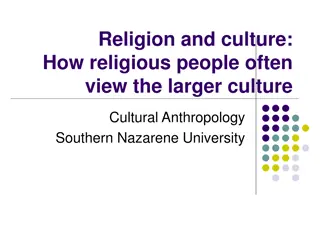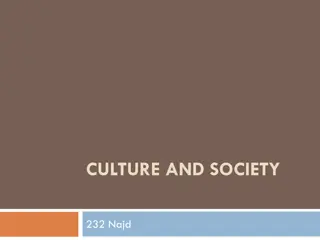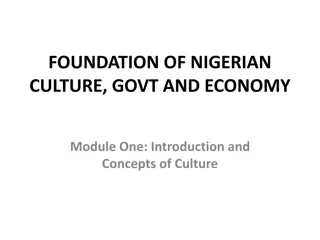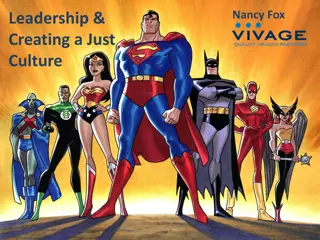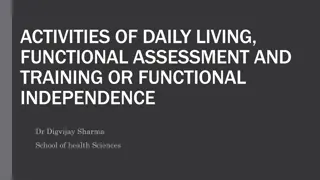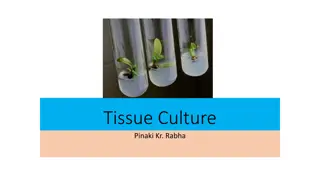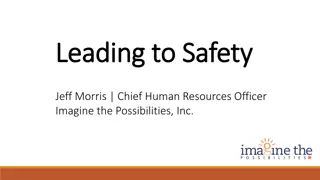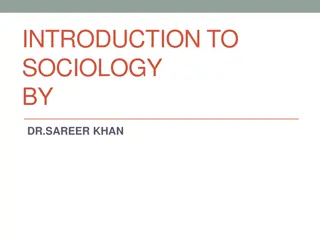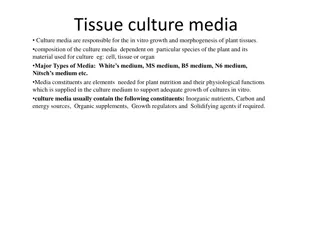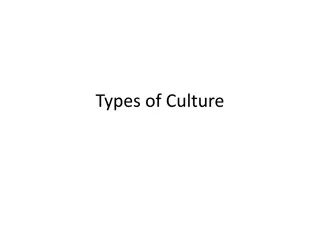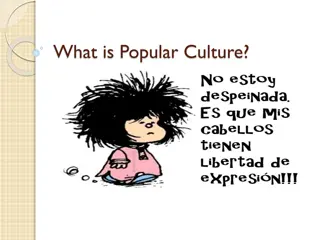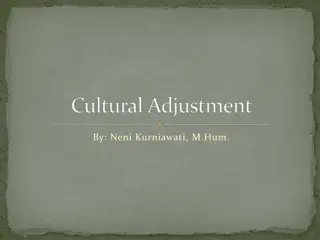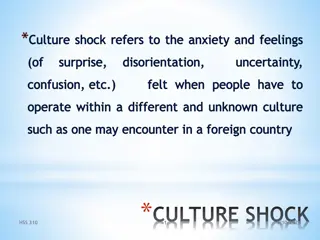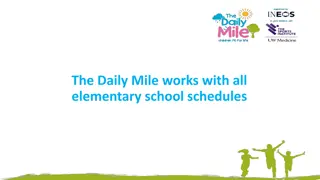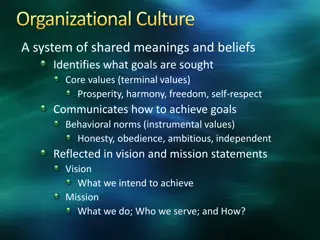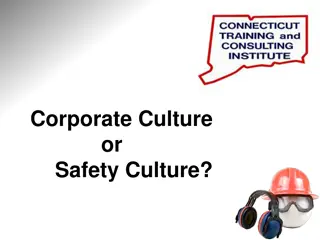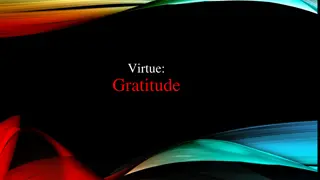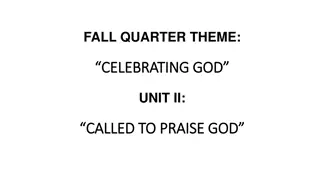The Importance of Saying Thanks in Daily Life and Culture
Saying thanks is a vital part of our daily interactions and reflects important cultural norms. Expressing gratitude is commonplace for receiving help, gifts, invitations, or information. This content showcases formal and informal ways to thank someone and appropriate responses. It also focuses on grammar structures for expressing gratitude and provides examples of thank-you dialogues. Additionally, it includes language focus on making invitations formally and informally in various scenarios.
Download Presentation

Please find below an Image/Link to download the presentation.
The content on the website is provided AS IS for your information and personal use only. It may not be sold, licensed, or shared on other websites without obtaining consent from the author.If you encounter any issues during the download, it is possible that the publisher has removed the file from their server.
You are allowed to download the files provided on this website for personal or commercial use, subject to the condition that they are used lawfully. All files are the property of their respective owners.
The content on the website is provided AS IS for your information and personal use only. It may not be sold, licensed, or shared on other websites without obtaining consent from the author.
E N D
Presentation Transcript
Saying Thanks Saying thanks is a part of our daily lives and important part of every culture. We thank people for help, gifts, invitation, information.
Thank you Formal -Thank you. -Thank you very much. - That s very kind/nice of you. - I really appreciate that. - Thank you very much for Informal Thanks a million. Thanks a lot. Thanks for everything.
Responding Formal You re welcome. It s my pleasure. With pleasure. Not at all. Don t mention it. Informal That s all right./That s ok. No, problem. Forget it. Don t worries about it. It was nothing. It was no trouble.
Grammar focus Thank you + for + gerund (v+ing) / Thanks/Thank you + you + for + noun Example : Thank you for picking up me. Thanks for finding it. Thank a lot for your invitation. Many thanks for the delicious birthday cake.
Conversations Dialogue 1 A : Thanks a lot for inviting me. I m glad to come. B : I m glad to have. Dialogue 2 A : Thanks a lot for the information. I really appreciated it. B : Don t mention it. Dialogue 3 A : Thanks for joining us. B : My pleasure.
Conversations Dialogue 4 A : Thank you for coming. B : It s my pleasure. Dialogue 5 A : You are so nice to give me these leather gloves. B : You re welcome. I think it looks beautiful on you.
Language focus Example - Would you like to go to a movie tonight? - Do you want to go out to dinner with the manager on Friday night? - How about visiting the building site at Rayong on Thursday? Would you like to + V1? Do you want to + V1? How about V- ing + noun (phrase)?
Invitations Formal Informal - We would like you to a dinner party. - We would like to ask you to come to a conference. - We are wondering if you would like to join us. - What about dinner tonight? - How about coming for a meal. - Let s go our place for dinner.
Accepting Invitations Formal Informal - Thank you very much. I would love to. - Yes, thanks. That would be great. - Thanks for inviting me. - I would love to come. - Thanks. That s good idea. - Sound great/like fun. - Ok. / All right.
Refusing Invitations Formal Informal - Thanks for inviting me, but I m afraid I can t come. - That s very kind of you. but I can t. - I m awfully/ terribly sorry, but I have already made another plans. - Thanks for asking, but I m afraid I m busy. - I would like to, but I can t. Thanks anyway. - I m afraid I can t. - Sorry. I can t. - Sorry. I ve already another plans.
Language Focus Saying sorry Responding I m very sorry. Oh, I m terribly sorry. I m really sorry. It s my fault. I m extremely sorry. Please accept my apologies. I really do apologize. Please forgive me. I can t tell you how sorry I am. Excuse me for hitting you. Not at all. That s all right. That s OK. Not to worry. Please don t worry. It doesn t matter at all. Forget it. No, problem. Don t worry about it.
Speaking Dialogue 1 A : I beg your pardon for interrupting. B : That s all right. Dialogue 2 A : I m terribly sorry. I didn t do it on purpose. B : Don t worry about it.
Speaking Dialogue 3 A : Excuse me, where is the nearest post office? B : I m sorry I don t know. A : I see. And where is Friday s Department Store? B : Pardon? A : Fri-day s. B : It s on the right corner at the intersection. A : Thank you very much. B : You re welcome.
Speaking Dialogue 4 Pitak : I m planning to go camping next weekend. Sunun : I m sorry, I m busy next weekend. Pitak : Are you sure you don t want to go? It should be a lot of fun. Sunun : No, I really can t. I m sorry.
Condolences and Sympathy We express sincere sympathy and offer to help people who experienced something unfortunate such as sickness, an accident, a disappointment, or the death of someone close to them.
How do you say? Question : A : What s wrong with you? You look unhappy, sad, terrible, worried. B : I m upset about - my poor grades. - my studies - my bad health A : Don t be discouraged. Try harder, Do more rest, Do more exercise, Get more exercise.
Language Focus Expressing Condolences - What a pity! - What a shame! - How terrible! - How awful! - Oh, that s too bad. - That s shame. - That s a pity. - I m sorry to hear that. Expressing Sympathy - I understand - I know how he feels - I can easily imagine - Let me help - What can I do ? - I would like to do something
Sample phrases A : I am deeply sorry to hear about your grandmother. B : Thank you very much. I m deeply moved. A : I was sorry to hear you didn t win the scholarship. B : I appreciate your kindness. I hope I ll do better next year. A : How awful to hear about your accident. Are you OK? B : It s very kind of you to be so concerned but really, I m fine now. A : Too bad you didn t get the raise. I was hoping you would! B : Thanks for your support. Sometime things don t go the way we want, do they?
Letters of Condolence I am very sorry to hear about the loss of your .. I would like to express to you my deepest sympathy. Offering to help Example - If there is anything I can do, now or later. I hope you will not hesitate to let me know. - If we can be helpful in anyway, please let us know. - Please call on me if there is anything I can do to help you.
Letters of condolence June 2, 2013 Dear Namchoke, Elizabeth and I are very sorry to hear about you loss. We would like you to know that you have our deepest sympathy and if there is anything we can do for you, please be sure to call on us. Best regards, Rakthai,
Transportation Transportation ( public transportation, public transit or mass) comprises all transport system which the passengers do not need to travel by their vehicles. The vehicles includes buses, trains, aircrafts which transport the passengers or things from one place to another. In these days, Public transportation becomes the important key for our daily travel.
Grammar focus 1.1 Preposition By + noun example : by car, by bus, by train, By underground, by motorcycle, by bicycle - I go to work by bus. - I m going to Paris by plane. 1.2 On + a/the + noun example : a plane/the plane , a train/ the train - I go to work on the subway. - I m writing this letter on the plane.
1.3. In/ At example : - In the departure lounge - at the check-in 1.4. preposition with get : - get in/ get into - get in the/a car. - get into the/a taxi. - get on example - get on the/a bus. - get off example : get off boat, ship
2. Giving Warning/Expressing rules Telling people to do something Should + infinitive (v1) Example : You should drive carefully. Should not + infinitive (v1) Example : They should not drink alcohol. Other warning : Wear safety boots. , always switch off, Try to get some sleep, Keep hands away from moving.
Not to do Telling the people not to do something - Do not/ Don t + v1 - Don t drink in this area. - Do not use a machine. - Never + v1 - Never sleep in this area.
Special Occasions A special greeting is used in the special occasions including special days, holidays. Most of all people often make a speech of greeting for special occasion such as weddings, dedications, award ceremonies, retirement dinner, etc.
Make a Wish - Happy New Year. - Happy Valentine day./ Happy Valentine s Day - Happy Song Kran day. - Merry Christmas. - Happy Wedding day. - I wish you have many years of happiness. - Have a nice day./ Have a good trip.
I wish you + blessing Example : - I wish you happiness. - I wish you good luck. - I wish you health. - I wish you well. - I wish you the best. - I wish you have a good family.
Blessing for contest/ safe trip - Good luck. - I wish you the best. - Hope you get it. - Bon Voyage. - Have a pleasant trip. - Have a nice trip. - I wish you the best.
Conversation Practise A : Happy Birthday, Jenny! This is a present for you. B : It is nice of you. Thank you. A : I wish you many years of happiness. B : You, too.
Congratulations - Congratulations. - Congratulations on your graduation. - Congratulations on your success. - Happy graduation. - I m glad to hear it. - That s great. - How lucky you are! - What wonderful news!


